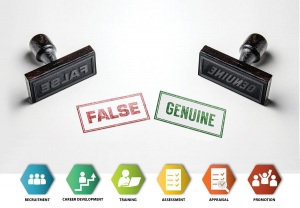


(Posted on 28/02/20)
The problem of fraudulent certificates is well-known and pronounced in the maritime industry. Already in 2001 the IMO detected 12.635 cases of certification forgery. While this figure is shocking enough, there is no way of knowing how many other cases have gone undetected.
While the scale of the problem is unquantifiable, the fact remains that there are currently thousands of false certificates in circulation. As such, any seafarer certification that comes from sources that do not verify the supporting evidence will remain questionable and potentially suspect. As the problem of fake certification grows, companies require verified certificates that prove the seafarers have passed the necessary training.
“The competence of seafarers is the most crucial factor in the safe and efficient operation of ships and has a direct impact on the safety of life at sea and the protection of the marine environment,” IMO.
STCW was created to ensure that the highest standards of seafarers’ competence are maintained globally. However, with false certification in circulation, companies are always at risk of employing someone who has been issued faked documentation. This increases the risk of personnel carrying out tasks they are not trained to perform, risking the safety of the crew, the ship and the environment.
Fake certification is a global issue. An EU-sponsored pilot project, branded ‘GetQuality’, revealed that “nearly every tenth seafarer worldwide” has experienced fraudulent certificates, whether directly or indirectly. The study found that the fake certificates undermine the training and certification system, evoke suspicion and distrust between partners and countries, and cause danger to human safety at sea. One of the largest concerns is the lack of verification process following proof of certification.
In India the problem made headlines recently. In what was described as “the biggest fake certificate scam yet”, India’s Directorate-General of Shipping found fake certificates from five training institutes where the necessary training had not been completed. After initially being barred from working, some seafarers have since been allowed to take new courses at approved training institutes to restart their careers. Others face a five-year disbarment.
As a leading providing in maritime training, Seagull Maritime has developed a system that makes it easy for anyone to verify the validity of certificates. Seagull’s department is subject to regular audits to ensure that the course diplomas are issued in accordance with strict QA standards. The company’s QR codes ensure the authenticity of new course diplomas’ can be confirmed at all times, while older course diplomas are verified through the imprinted Seagull logo.
With so many fake certificates out there, Seagull Maritime’s solutions ensure all diplomas are subject to a strict course verification process that proves the seafarer has completed the necessary training.
AtoB@C Shipping, a subsidiary of ESL Shipping, has announced the successful delivery of Fleximar, the... Read more
Western Bulk, together with reputable Norwegian partners A/S J. Ludwig Mowinckels Rederi, Premium Maritime... Read more
Pacific Basin Shipping Limited, one of the world’s leading dry bulk shipping companies, has announced... Read more
Columbia Group anticipates a period of strong expansion as an increasing number of international shipowners... Read more
Norse?Ship Management has expanded its use of Smart Ship Hub’s high frequency sensor data and... Read more
As the maritime industry gears up to welcome the IMO’s STCW bullying and harassment training amendments... Read more
NORDEN has acquired the cargo activities of Taylor Maritime in Southern Africa (previously operated... Read more
Philippos Ioulianou, Managing Director of EmissionLink, has warned the IMO’s decision to delay... Read more
VIKAND has highlighted the need for cultural change in the maritime sector as reports of bullying, harassment... Read more
The maritime industry is experiencing a period of significant transformation, driven by rapidly evolving... Read more